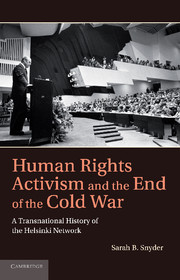Book contents
- Frontmatter
- Contents
- Acknowledgments
- Introduction
- 1 Bridging the East–West Divide
- 2 “A Sort of Lifeline”
- 3 Even in a Yakutian Village
- 4 Follow-up at Belgrade
- 5 Helsinki Watch, the IHF, and the Transnational Campaign for Human Rights in Eastern Europe
- 6 Human Rights in East–West Diplomacy
- 7 “A Debate in the Fox Den About Raising Chickens”
- 8 “Perhaps Without You, Our Revolution Would Not Be”
- Conclusion
- Bibliography
- Index
2 - “A Sort of Lifeline”
The Helsinki Commission
Published online by Cambridge University Press: 01 June 2011
- Frontmatter
- Contents
- Acknowledgments
- Introduction
- 1 Bridging the East–West Divide
- 2 “A Sort of Lifeline”
- 3 Even in a Yakutian Village
- 4 Follow-up at Belgrade
- 5 Helsinki Watch, the IHF, and the Transnational Campaign for Human Rights in Eastern Europe
- 6 Human Rights in East–West Diplomacy
- 7 “A Debate in the Fox Den About Raising Chickens”
- 8 “Perhaps Without You, Our Revolution Would Not Be”
- Conclusion
- Bibliography
- Index
Summary
The Helsinki Final Act's fourth basket set a follow-up meeting to assess compliance in Belgrade in 1977, giving countries more than two years to begin putting the provisions agreed to at Helsinki into practice. In the intervening years, the agreement inspired a range of people inside and outside government to develop formal and informal mechanisms to monitor Helsinki implementation. The myriad of international responses represented the beginning of the development of a transnational Helsinki network. In the United States, legislative involvement in the CSCE process dramatically heightened in the immediate aftermath of Ford's trip to Helsinki, beginning with a congressional delegation to Moscow and culminating with the creation of a joint legislative–executive commission to monitor implementation of the agreement. Officially known as the Commission on Security and Cooperation in Europe, it also was called the Helsinki Commission and the Fascell Commission for its long-time chair, Representative Dante Fascell (D-FL). This chapter maps the development of the Commission, including executive branch opposition to its creation; analyzes the Commission's early efforts at monitoring; and evaluates its significance to the broader Helsinki process. As will be illustrated later, the Commission enhanced United States monitoring of compliance with the Helsinki Final Act and facilitated the development of a network of groups and individuals committed to its implementation, heightening the influence of the Helsinki process over time by buttressing nongovernmental human rights activism abroad.
- Type
- Chapter
- Information
- Human Rights Activism and the End of the Cold WarA Transnational History of the Helsinki Network, pp. 38 - 52Publisher: Cambridge University PressPrint publication year: 2011

